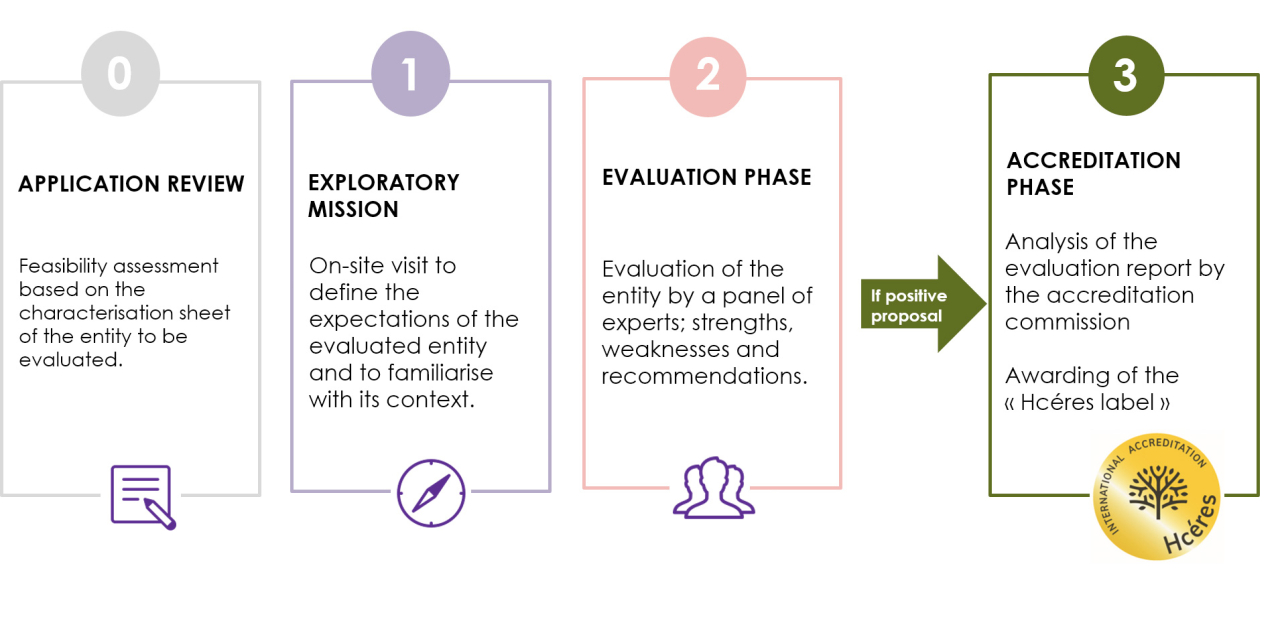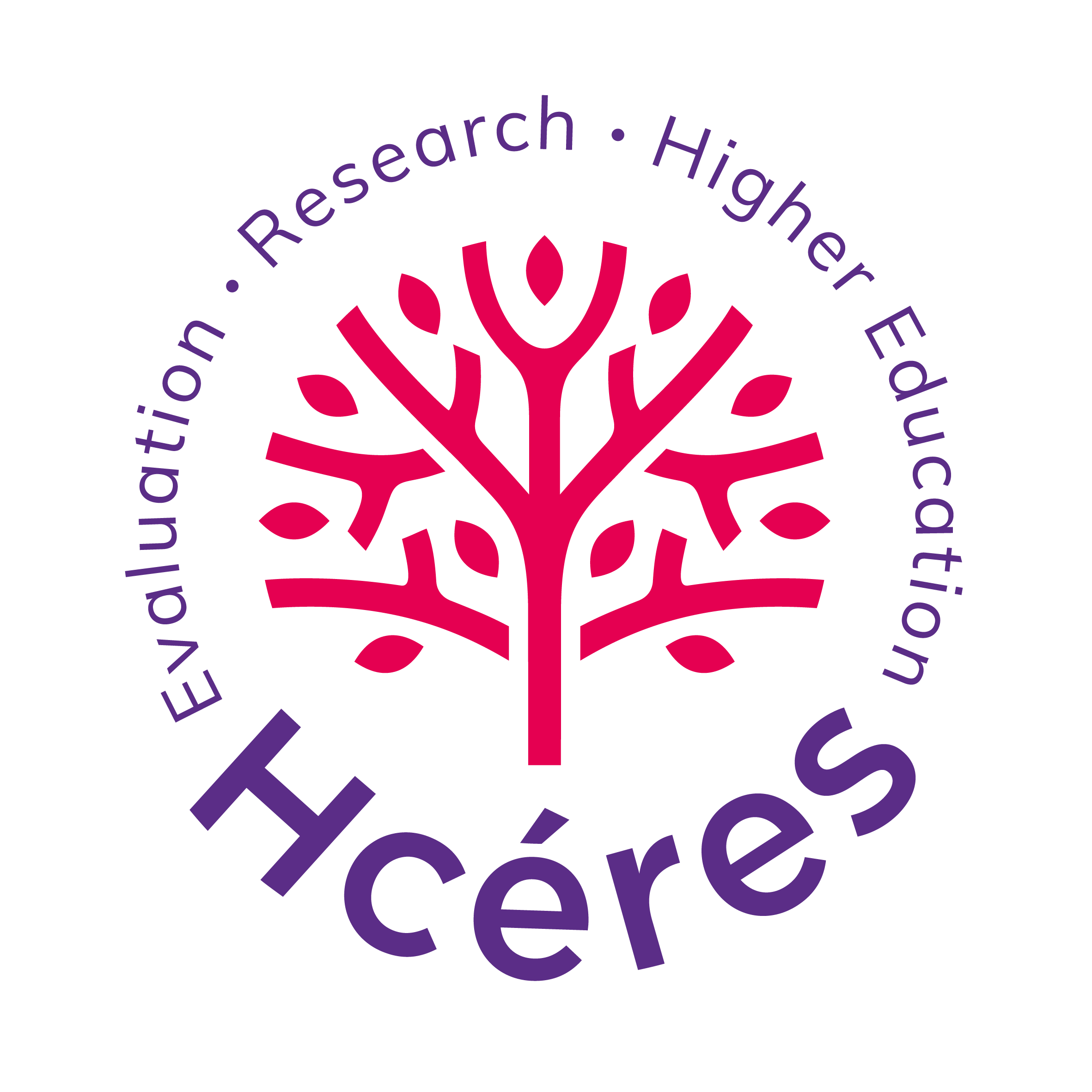Evaluations and accreditation
-
Table of contents
International evaluations and accreditation by Hcéres

Evaluation procedure
The different stages of the evaluation process are as follows:
- After a preliminary analysis of the feasability of the evaluation, an exploratory mission is organised with an on-site visit by a Hcéres project team; at this point, the members of the exploratory mission can alert the institution to the fact that it does not yet seem ready to commit to the accreditation process
- Drafting of an agreement between the institution and Hcéres
- A self-assessment phase prior to any evaluation
- An external evaluation phase led by an expert committee with an on-site visit
- Sending of the provisional evaluation report to the institution
- Observations by the institution
- Publication of the final report or start of the accreditation procedure at the institution’s request
The evaluation frameworks used internationally are inspired by the French frameworks and, for the institutional and programmes standards, are based on the Standards and Guidelines for Quality Assurance in the European Higher Education Area (ESG).
The evaluated entities are: institutions, study programmes research units or research bodies.
The total procedure takes approximately 18 months and is overseen by a permanent member of the Europe and International Department team.
Accreditation procedure
Accreditation can only take place after the completion of the evaluation report (of the institution, study programme, research unit or research body), at the request of the entity.
It involves three phases:
- Accreditation proposal drafted by the expert committee
- Referral to the accreditation commission. This is composed of five members and is chaired by the president of Hcéres.
- Deliberation and decision of the president of Hcéres. This may be:
- A decision of accreditation for five years,
- A decision of accreditation for three years,
- A decision to refuse accreditation.
The accreditation leads to the award of the Hcéres label.
Please note that the decision regarding accreditation of the institution does not mean that degrees awarded by the accredited institution will be recognised in France. The Hcéres accreditation process therefore has no effect on the process by which France recognises degrees awarded by the labelled institution.
Documents to download
The evaluation of an institution covers the following three areas:
- Strategic and operational management
- Policy regarding on research, innovation and the inclusion of science in society
- Education, student and campus life policy
Documents to download
Hcéres evaluates programmes at all three levels: bachelor, master and doctorate, in all disciplines. Doctorates/PhDs are covered by specific guidelines.
The evaluation of a programme (excluding doctorates/PhDs) covers the following four areas:
- Education policy and characterisation
- Pedagogical organisation of the study programme
- The attractiveness, performance and relevance of the study programme
- Academic programme management and continuous improvement
The standards for the evaluation of doctorates/PhDs are structured into four areas:
- PhD policy
- Training, hosting and supervision arrangements for PhD students
- Attractiveness, performance and relevance of the PhD
- Management and continuous improvement of the PhD
For joint programmes, the recommended procedure is that of the European Approach (see below).
Documents to download
Research units benefit from either complete or partial autonomy, within a national or local research organisation or higher education and research institution (university or research centre).
The evaluation of a research unit covers the following five areas:
- Research policy of the unit
- Attractiveness and international recognition
- Scientific output
- Link between research and education
- Inclusion of research activities in society
Documents to download
Hcéres evaluates any public or private body engaged in research, including funding agencies. The laboratories of higher education institutions and research bodies are evaluated in the framework of the evaluation procedure for research units.
The evaluation of a research body covers the following five areas:
- Institutional positioning and strategy
- Governance and organisation
- Main features of strategy implementation
- Activities and outcomes
- Strategic orientation for the coming years
Documents to download
European evaluations and accreditation by Hcéres
Hcéres is also authorised to conduct procedures internationally, based on guidelines drawn up at the European level.
As an agency registered in The European Quality Assurance Register for Higher Education (EQAR), Hcéres is authorised to conduct evaluations of joint programmes according to the European Approach guidelines and procedure. A “joint programme” is defined as an integrated and coordinated programme proposed jointly by different higher education institutions leading to double/multiple degrees or a joint degree.
What is the European Approach?
The European Approach was adopted in May 2015 by European higher education ministers as part of the Bologna Process, in order to facilitate the evaluation and recognition of joint programmes. It consists of a unique evaluation procedure conducted by a single agency registered in The European Quality Assurance Register for Higher Education (EQAR), carried out according to a specific European methodology and guidelines. The European Approach makes it possible to highlight the joint nature and European value of a programme . The standards are based on the Standards and Guidelines for Quality Assurance in the European Higher Education Area (ESG).
Procedure
The evaluation process based on the European Approach takes an average of nine months between the signing of the agreement and the completion of the external evaluation report. The evaluation and the report are conducted in English. The label is valid for six years.

The accreditation procedure for joint programmes is different from the evaluation procedure for study programmes carried out by Hcéres. If the consortium wishes to have its joint programme accredited, each partner must send the evaluation report produced by Hcéres to its national accreditation body (ministry or agency).
- Discover all evaluation reports produced with the European Approach
- Master Bio Marine Technology de l'Université européenne EU-CONEXUS ;
- Master Erasmus Mundus « Latin America and Europe in a Global Word » (LABLOBE) ;
- Master Erasmus Mundus « GOvernance & Administration of Leisure and Sports » (GOALS) ;
- Master Degree in the Sustainable Management of Organisations: Sustainability Transition for Organisations and Resilience Management (STORM).
Document to download
As a partner of the Certificate for Quality in Internationalisation (CeQuint) label since its creation by The European Consortium for Higher Accreditation in Higher Education (ECA) in 2015, Hcéres is authorised to evaluate a programme or institution according to the European Certificate for Quality in Internationalisation (CeQuint) guidelines.
What is the Certificate for Quality in Internationalisation (CeQuint) label?
The Certificate for Quality in Internationalisation (CeQuint) label highlights the quality of the internationalisation of an institution or programme. Obtaining the label, which is valid for five years, certifies that an institution or programme has successfully integrated an international and intercultural dimension into the aims, organisation and implementation of its activities. It is a label of excellence based on a specific methodology and guidelines drafted in English.
The Certificate for Quality in Internationalisation (CeQuint) procedure may be carried out alone or may be requested alongside an evaluation by Hcéres in a national or international context. An institution evaluated with success may then request accreditation from The European Consortium for Higher Accreditation in Higher Education (ECA).
More information about the label on the Certificate for Quality in Internationalisation (CeQuint) website.
Procedure
The institution completes an application form on the label website, indicating Hcéres as the coordinating agency.

Documents to download
- Terms of Reference

- Frameworks for the Assessment of Internationalisation

- Guide to Assessing the Quality of Internationalisation




